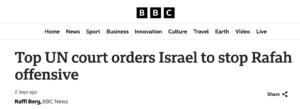The International Court of Justice (ICJ) issued an emergency ruling last week as part of South Africa’s case accusing Israel of genocide.
The ruling read, in part, that the Israel Defense Forces must “immediately halt its military offensive, and any other action in the Rafah governorate, which may inflict on the Palestinian group in Gaza conditions of life that could bring about its physical destruction in whole or in part.”
Five of the 15 judges authored an opinion that accompanied the ruling, with four of the five arguing that it does not halt military action in southern Gaza — only such action that could bring about, in whole or in part, the destruction of the Palestinian people.
The distinction is important: it allows Israel to continue its military action against Hamas in Rafah.
It was a distinction that was lost on the international media, which invariably interpreted the ruling as ordering Israel to halt its Rafah offensive entirely.
Misleading Headlines
The immediate media reaction to the ruling was a rash of headlines that claimed the UN’s highest court was effectively halting the IDF’s campaign in Rafah.
The BBC, NBC News, CNN and Newsweek all published pieces that stated the ICJ had ordered an “immediate” end to the military offensive:




While the individual articles included the relevant part of the ruling that makes clear it is not a blanket order against military action, their headlines tell readers the opposite.
Unsurprisingly, the media’s presentation of the ruling has been criticized by Israeli officials, who pointed out that it does not prevent Israel’s right to both defend itself and free the hostages kidnapped by Hamas on October 7.
“It said genocide is forbidden, and we have no intention of committing genocide. What country would invest so many resources to bring in humanitarian aid, call off attacks and the like, if it intends to commit genocide? We are already doing and will continue to do what the ruling has called for,” one official told Ynet News.
Part of a Pattern
More importantly, the misleading reports on the ICJ’s ruling appear to be part of a trend in which news outlets have misinterpreted critical legal rulings about Israel’s conduct in its war against Hamas.
Following the ICJ delivering its initial ruling on South Africa’s case in late January, the majority of media organizations claimed the court had decided there was a “plausible” claim of Israeli genocide in Gaza — an allegation that was immediately refuted by legal experts who had read the ruling in its entirety.
Yet, for weeks, news outlets continued to print the pernicious lie that the UN court had effectively decided that there was credible evidence that Israel was perpetrating genocide.
Indeed, it was not until ICJ judge Joan Donoghue, who served as president of the court between February 2021 and February 2024, appeared on the BBC current affairs program HARDTalk in April that the media started correctly reporting on the court’s decision.
Joan Donoghue, former President of the International Court of Justice, clarified on air with @BBCNews that the court did *not* decide that Israel’s war against Hamas in Gaza could plausibly be considered genocide. pic.twitter.com/oz1lOCUMD6
— HonestReporting (@HonestReporting) April 26, 2024
Speaking to the BBC’s Stephen Sackur, Donoghue explained that she was “glad” to have the opportunity to explain the effect of the ruling.
“The court decided that the Palestinians had a plausible right to be protected from genocide and that South Africa had the right to present that claim in the court,” she said. “It then looked at the facts as well. But it did not decide – and this is something where I’m correcting what’s often said in the media – it didn’t decide that the claim of genocide was plausible.”
Donoghue’s unequivocal correction of the media’s misreporting should have served as a valuable lesson for news outlets in navigating the complexity and nuance of legal rulings.
And yet, just weeks later, as the International Criminal Court (ICC) lead prosecutor Karim Khan announced he would seek arrest warrants for the arrest of Israeli Prime Minister Benjamin Netanyahu and Defense Minister Yoav Gallant alongside several Hamas leaders, the media once again skewed the facts.
Failing to understand the distinction between Khan seeking arrest warrants to be issued and them actually being issued, several news outlets suggested the latter had occurred.
NPR, for example, aired a two-minute segment “examining Israeli Minister of Strategic Affairs Ron Dermer’s statements on the ICC issuing arrest warrants for Prime Minister Benjamin Netanyahu.”
The Hill also implied warrants had already been issued in a piece headlined, ‘US lashes out after Israeli officials targeted with arrest warrants,’ which told readers that the ICC itself had “filed arrest warrants against two top Israeli leaders over the war in Gaza…”
Here are some things you should know about the @IntlCrimCourt seeking arrest warrants for Israeli PM @netanyahu and Def. Min. @yoavgallant, along with Hamas leaders Sinwar, Deif, & Haniyeh.
🧵
— HonestReporting (@HonestReporting) May 20, 2024
The media have—whether by intention or carelessness—misinterpreted three separate legal orders that relate to Israel’s war against Hamas.
On each occasion, their misreporting was damaging to Israel.
British author Ian Fleming famously said, “Once is happenstance. Twice is coincidence. Three times is enemy action.”
How salient his observation seems now.
Liked this article? Follow HonestReporting on Twitter, Facebook, Instagram and TikTok to see even more posts and videos debunking news bias and smears, as well as other content explaining what’s really going on in Israel and the region.
Image: Nikos Oikonomou/Anadolu via Getty Images



